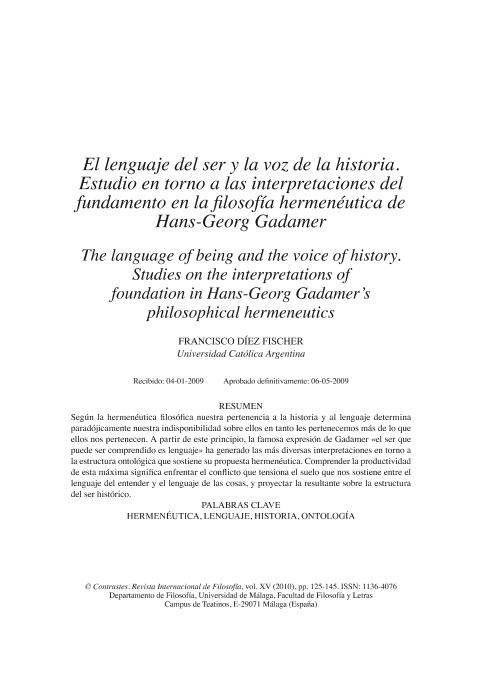Artículo
Según la hermenéutica filosófica nuestra pertenencia a la historia y al lenguaje determina paradójicamente nuestra indisponibilidad sobre ellos en tanto les pertenecemos más de lo que ellos nos pertenecen. A partir de este principio, la famosa expresión de Gadamer «el ser que puede ser comprendido es lenguaje» ha generado las más diversas interpretaciones en torno a la estructura ontológica que sostiene su propuesta hermenéutica. Comprender la productividad de esta máxima significa enfrentar el conflicto que tensiona el suelo que nos sostiene entre el lenguaje del entender y el lenguaje de las cosas, y proyectar la resultante sobre la estructura del ser histórico. According to philosophical hermeneutics our belonging to history and language determines our paradoxical unavailability over them as we belong to them more than they belong to us. Based on this principle, Gadamer’s famous expression «being that can be understood is language» has raised the most diverse interpretations about the ontological structure that supports the hermeneutical proposal. Understanding the productivity of this maxim means confronting the conflict that shakes the ground which sustains us between language of understanding and language of things, and projecting the result on the structure of historical being.
El lenguaje del ser y la voz de la historia: estudio en torno a las interpretaciones del fundamento en la filosofía hermenéutica de Hans-Georg Gadamer
Título:
The language of being and the voice of history: studies on the interpretations of foundation in Hans-Georg Gadamer’s philosophical hermeneutics
Fecha de publicación:
05/2009
Editorial:
Universidad de Málaga
Revista:
Contrastes
ISSN:
1136-4076
e-ISSN:
2659-921X
Idioma:
Español
Tipo de recurso:
Artículo publicado
Clasificación temática:
Resumen
Palabras clave:
HERMENÉUTICA
,
LENGUAJE
,
HISTORIA
,
ONTOLOGÍA
Archivos asociados
Licencia
Identificadores
Colecciones
Articulos(SEDE CENTRAL)
Articulos de SEDE CENTRAL
Articulos de SEDE CENTRAL
Citación
Díez, Francisco; El lenguaje del ser y la voz de la historia: estudio en torno a las interpretaciones del fundamento en la filosofía hermenéutica de Hans-Georg Gadamer; Universidad de Málaga; Contrastes; 15; 5-2009; 125-145
Compartir
Altmétricas




